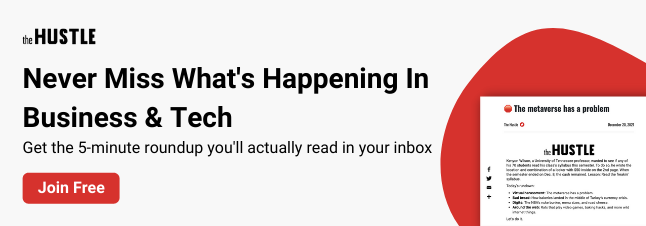Social media. It’s where consumers and even employers turn to check out a person before hiring or doing business with them. But it’s not enough to have a brand page for your business or a lackluster personal profile.
 (1).png?width=595&height=400&name=15_Hustle%2040-60-Collaboration-72%20%286%29%20%281%29.png)
Not when you have 71% of US HR professionals using social media to screen candidates and another 21% not considering candidates without an online presence.
If you’re a brand, consumers are 4x-6x more likely to buy from purpose-driven companies. What better way to share your mission than with a personal brand?
So whether you’re looking to grow your professional career or build a human face for your business, knowing how to brand yourself is key.
What is a brand?
A brand is a unique and recognizable identity a company, product, or service creates to differentiate itself. It includes the overall image, values, personality, and reputation associated with the entity.
But a brand isn't just a logo or a name — it includes the emotions and perceptions people have toward it. It’s the personality of a business, conveying its purpose, promise, and values to its target audience. When you have a strong brand, it builds trust, loyalty, and credibility, making it easier for customers to choose and connect with the company or product.
What is a personal brand?
A personal brand is the image a person creates to establish and promote their professional identity. It’s how they present themselves online and offline, and encompasses their skills, expertise, values, and personality. A personal brand isn’t just about self-promotion — it’s also about building trust, credibility, and influence in a specific field.
Personal brand building requires consistent and compelling narratives showcasing your strengths, passions, and achievements. It’s a powerful tool for individuals to differentiate themselves and stand out in a competitive job market or business landscape.
What makes up a personal brand?
A personal brand is most successful when you include the following elements:
- Clear and compelling messaging: Communicate who you are, what you do, and what value you provide to others.
- Authenticity: Be true to yourself, allowing your unique personality and values to shine.
- Consistency: Maintain a consistent presence across all platforms, ensuring your brand message and visuals align.
- Professional reputation: Build a strong reputation by consistently delivering quality work and demonstrating expertise in your field.
- Visual identity: Develop a visually appealing brand identity with a professional headshot, logo, and consistent color scheme.
- Online presence: Establish a strong online presence through social media platforms, a personal website, and industry-related forums.
- Thought leadership: Demonstrate your expertise and knowledge by sharing valuable insights and content related to your field.
Why you should brand yourself
People build personal brands for different reasons. Here are some of the top benefits of branding yourself:
- Increased visibility and recognition in your industry
- Improved credibility and trust with your audience
- Enhanced opportunities for career advancement or business growth
- Stronger connections and relationships with like-minded professionals
- Ability to showcase your expertise and establish yourself as a thought leader in your field
- Increased influence and impact on your target audience
- Higher perceived value and differentiation from competitors
- Improved job prospects and networking opportunities
- Increased opportunities for collaboration and partnerships
- Overall personal and professional growth and development
If you’re a business owner, you can use your personal brand to build human connections with your followers, increasing your company’s revenue and brand loyalty.
How to brand yourself: Nine tips
How you build your personal brand depends on your goals. If you want to grow your career, then there’s no reason to build a million-person following. Nor should you attempt to tailor your content to the masses. The more focused your purpose and content, the better it’ll perform.
Here are nine tips to brand yourself successfully.
1. Find what makes you unique
Billions of users have social media profiles, and the majority of users (53%-73%) check their social feeds daily. This says two things:
- A lot of people are on social daily, building their presence (high competition)
- Many people are on social media every day looking to consume content (high demand)
But to take advantage of this scenario, you must develop a unique personal brand. Otherwise, you’re just another profile receiving little to no engagement or follows. The goal is to create content your audience needs and use your unique voice to share it.
For example, you can share your expertise on a specific topic, a unique perspective on a current event, or tell a personal story that resonates with your audience.
2. Define your target audience
Who will find your content interesting and share it with others they know? Trying to create for everyone is a sure way to have your posts drowned out in a sea of other content.
Niche down by selecting a key area of your field you enjoy discussing daily. Then, list who you think would be most interested in it.
For example, if you’re a digital marketer, you can zone in on SEO and target folks looking to grow organic traffic for their businesses, blogs, podcasts, or YouTube channels. Each are niche audiences — the deeper your niche, the narrower your audience, but it’ll make you the go-to expert on the subject.
Just be wary of going too niche and not having enough things to share to keep your posts consistent and fresh.
3. Look at what your peers are doing
There’s nothing wrong with “spying” on your competition. It’s how you learn what works. For instance, when you see an influencer publishing content that gets consistent likes and comments, you know it’s effective.
But don’t use this research to copy and paste another person’s personal brand. Instead, use it to identify the type of content, formats, and audiences you want to connect with.
For example, you may find the influencers in your niche that post video snippets get the most engagement. So you can plan your content to be more video-focused.
4. Publish bylined content on other platforms
Social media is just one channel to grow your visibility online. You have podcasts you can make guest appearances on, blogs you can guest write for, and webinars you can co-host.
The more people see you on different channels, the more recognizable and trustworthy you become. This is especially true if you appear on popular platforms with large audiences.
For example, if you’re an SEO expert, you can write guest posts on authoritative websites like Search Engine Journal or Marketing Land. Or appear on popular podcasts and share the content with your social media followers.
5. Develop valuable content
The content you create should provide value to your audience. For instance, if your followers are a group of real estate agents, you can talk about proven methods for finding or generating leads, tips for making the sales process smoother, or how to build a real estate website that ranks in Google.
By providing actionable tips and strategies that have worked for you, you help others to achieve success. And because you’re doing this for free, it’s the best value you can provide your followers.
6. Engage with your audience
Building a personal brand isn’t just publishing content. It’s also engaging in conversations with your audience. This includes replying to comments on your posts, as well as joining discussions with your followers or other influencers in your industry. Leveraging their visibility could earn you more attention, recognition, and followers.
When engaging with others, ask and answer questions, and provide support and guidance to build relationships and trust with your followers.
7. Network and collaborate
Branding yourself is easier when you have a network to learn from and collaborate with. You can find others in your niche to have a virtual coffee with to discuss the ups and downs of building a personal brand.
You may even find opportunities to collaborate on content to leverage each others’ audiences.
Ways to build your network include engaging with your peers’ content before reaching out via direct message, attending local conferences, joining Slack groups, and going to networking events.
8. Continuously learn and grow
New social networks come and go; knowing which to join and which to ignore is something you’ll have to learn as you go. It’s the same with content formats, topics, and trends that may change your content strategy and approach.
Stay updated with the latest trends, technologies, and developments in your field. For example, attend workshops, conferences, and webinars to enhance your skills and knowledge.
You can also find courses and online resources specifically about improving your personal brand.
9. Seek feedback and adjust
Running out of ideas. Falling into a lull. Losing engagement. It happens to even the best personal brands out there. But keep it going by seeking help and getting feedback from your followers and peers.
Getting external views about your content provides a fresh perspective and may inspire you to try new things.
So, regularly evaluate and seek feedback on your personal brand. Pay attention to how your audience responds to your content and adjust as necessary. And listen to constructive criticism to refine your brand message and strategy.
Building a personal brand is an ongoing process, and it requires constant attention and adaptation.





.png)
 (1).png)

.png)




